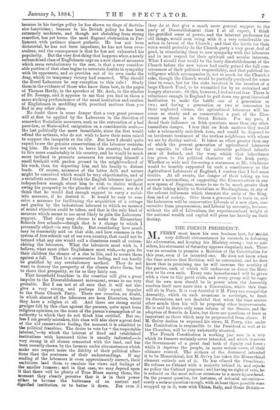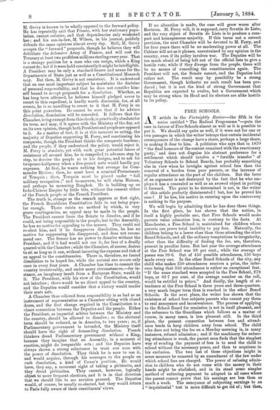THE FRENCH PRESIDENCY.
MFERRY must know his own business best, for amidst s very difficult circumstances he succeeds in defeating his adversaries, and keeping his Ministry strong ; but to out- siders, his statement of Saturday appears singularly rash. There
was no occasion to promise a Revision of the Constitution for this year, even if he intended one. He does not know when the time arrives that Revision will be convenient, and he does know that in promising one he will increase the acerbity of the parties, each of which will endeavour to direct the Revi- sion to its own ends. Every vote henceforward will be given with a view to this great crisis, and every group will be eager that its own man should be in power when the Assembly resolves itself once more into a Convention, which this time will sit in Paris. It is very doubtful if M. Ferry can compel the Assembly, which on such occasions . is sovereign, to limit its discussions, and not doubtful that when the time arrives other minds than his will be proposing other improvements.
He is said to desire only some reform of the Senate, and the adoption of Scrutin de Liste, but there are questions at least as important as those which may be propounded from above. If M. Gravy desires to expound his views, M. Ferry, who under the Constitution is responsible to the President as well as to the Chamber, will be very awkwardly situated.
The French Constitution is working just now in a way which its framers certainly never intended, and which deprives the Government of a great deal both of dignity and force ; while it deprives the people, in many serious cases, of their ultimate control. The authors of the document intended it to be Monarchical, but M. Gravy has taken the Monarchical element entirely out of it. He has effaced the Presidency. He refuses no Cabinet with a majority behind it, and rejects no policy the Cabinet proposes ; and having no right of veto, he is reduced on the most serious occasions to a mere figure-head. On the present question, for instance, of colonial extension— surely a serisus question enough, with at least three possible wars wrapped up in it, wars with China, Italy, and Great Britain-
M. Grevy is known to be wholly opposed to the forward policy. He has repeatedly said that France, with her stationary popu-
lation, cannot colonise, and that dependencies only weakened
her; and his son-in-law, M. Wilson, in his journal, publicly defends the same opinions almost every day. Still, M. Grevy
accepts the " forward" proposals, though he believes they will debilitate the defensive Army Of France, and will cost the Treasury at least two profitless millions sterling every year. That is a strange position for a man who can resign, which a King cannot do; but if it were held consistently it might be intelligible. A President may be only a standard-bearer and nexus for the Departments of State just as well as a Constitutional Monarch may. But then, M. Grevy is not consistent. It is understood that on one most important subject he maintains the doctrine of personal responsibility, and that he does not consider him- self bound to accept proposals for a dissolution. Whether, as has long been affirmed, he believes himself pledged never to resort to this expedient, is hardly worth discussion, for, at all events, he is so unwilling to resort to it that M. Ferry is on this point powerless. He cannot be sure that if he advises dissolution, dissolution will be conceded. It follows that the Chamber, being exempt from this check, is practically absolute for its term, and may, if it agrees with the Ministry of the day, act on its own opinion, though both President and people are opposed to it. As a matter of fact, it is at this moment so acting, the majority of Deputies supporting M. Ferry, and sanctioning his conquests, though the President thinks the conquests burdens ; and the people, if they understood the policy, would reject it. M. Ferry is absolute, yet with such great potential forces of resistance all around him, he is compelled to advance step by step, to deceive the people as to his designs, and to ask for twopence-halfpenny when a five-pound note would hardly pay expenses. At first, he wants nothing but revenge for Com- mander Riviere; then, he must have a nominal Protectorate of Tonquin ; then, Tonquin must be placed under " full military occupation ;" and to-morrow, be will claim Hainan, and perhaps be menacing Bangkok. He is building up an Indo-Chinese Empire by little bits, without the consent either of the French people or the French President. The truth is, strange as the remark appears at first sight, the French Republican Constitution fails in not being popu- lar enough. There exists no method by which, in very grave contingencies, an appeal may be made to the people. The President cannot force the Senate to dissolve, and if he could, not being responsible to the people, but to the Assembly, he has no motive for appealing to the masses. They could not re-elect him, and if he disapproves dissolution, he has no motive for suppressing his disapproval, and does not recom- mend one. The Senate has no power to dissolve without the President, and if it had would not use it, for fear of a deadly quarrel with the Chamber ; while the Chamber, of course, desires to sit as long as it can, without incurring the expense and risk of an appeal to the constituencies. There is, therefore, no forced dissolution to be hoped for, while the natural one occurs only once in every four years. A Chamber has time to commit the country irretrievably, and under many circumstances,—for in- stance, an imaginary insult from a European State, would do it. The President, with his view of the Constitution, would not interfere ; there would be no direct appeal to the country, and the Deputies would consider that a victory would render their seats safe.
A Chamber thus relieved from responsibility is as bad as an instrument of representation as a Chamber sitting with closed doors, and the first change required in the Constitution is a closer connection between the Deputies and the people. Either the President, as impartial arbiter between the Ministry and the country, should be allowed to dissolve ; or the electoral term should be reduced, as in America, to two years ; or, if Parliamentary government is intended, the Ministry itself should have the right of demanding dissolution. French thinkers dread Parliamentary government without a King, because they imagine that an Assembly, in a moment of emotion, might do irreparable acts ; and the Deputies have always shown a strong reluctance to trust one man with the power of dissolution. They think he is sure to use it, and would acquire, through his messages to the people on each dissolution, a kind of Caesar's position. He would have, they say, a recurrent right of taking a plebiscite, and they dread plebiscites. They cannot, however, logically objeot to more frequent elections, and it is in that direction that we should like to see revision proceed. The Deputies would, of course, be usually re-elected, but they would return to Paris fully aware of their constituents' views. If no alteration is made, the case will grow worse after Revision. M. Ferry will, it is supposed, carry Scrutin de Liste, and the very object of Scrutin de Liste is to produce a com- pact and homogeneous majority. If this turns out a correct prevision, the next Chamber will be devoted to M. Ferry, and for four years there will be no moderating power at all. The Cabinet will act as it pleases, unrestrained by any opinion in the country, even if its policy involves war. The Deputies will be too much afraid of being left out of the official lists to give a hostile vote, while if they diverge from the people, there will be no means of consulting the constituencies again. The President will not, the Senate cannot, and the Deputies had rather not. The result may by possibility be a strong Government, though hitherto no such result has been pro- duced ; but it is not the kind of strong Government that Republics are expected to evolve, but a Government which may be strong when its Head and its electors are alike hostile to its policy.







































 Previous page
Previous page